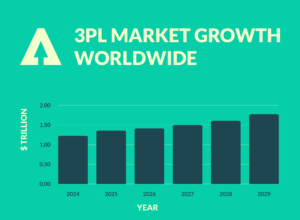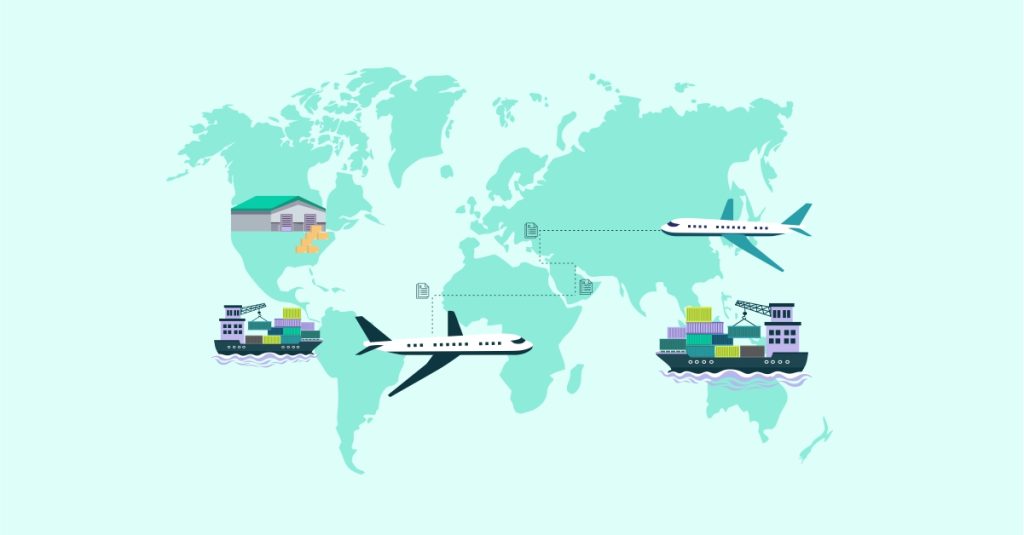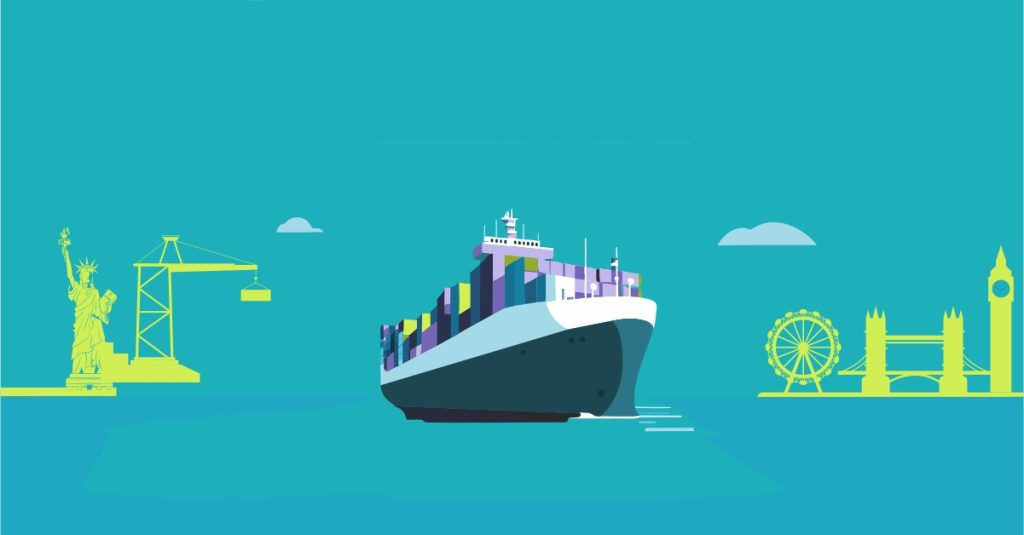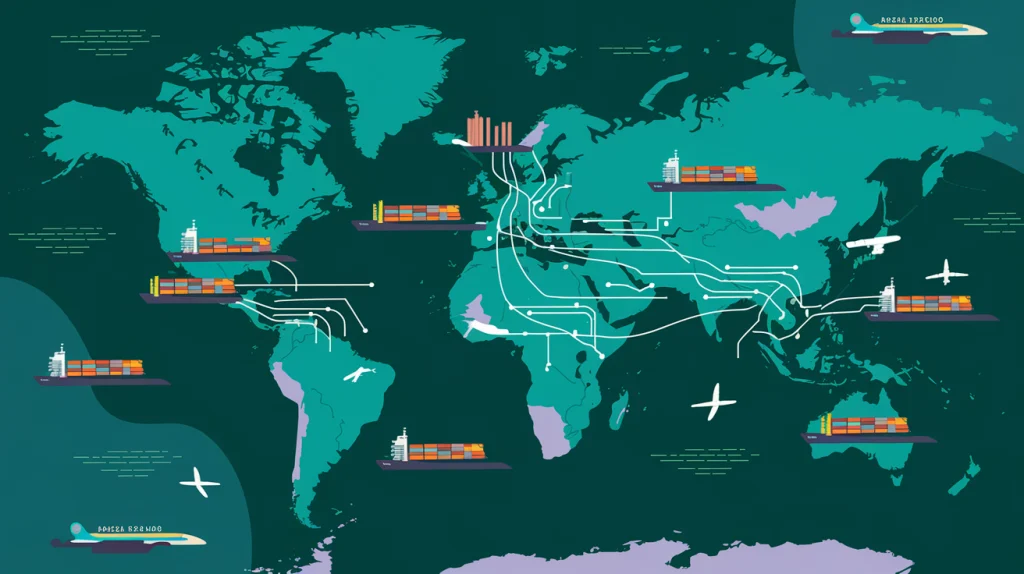Choosing the right 3PL for your business can be a daunting task. It’s not just about picking any provider; it’s about finding the one that aligns perfectly with your specific needs and goals. Making the wrong choice can lead to delayed shipments, slow fulfillment, and unhappy customers, which can ultimately harm your business.
To make an informed decision, you need to consider several key factors before starting your search. A good starting point is to identify your specific requirements and match them with the services offered by potential 3PL providers. Keep in mind that different 3PLs specialize in various areas, such as FBA/FBM, B2B, and B2C.
It’s crucial to ensure that the 3PL you choose has extensive knowledge and experience in your specific industry segment. For example, if you’re an Amazon seller, you’ll want to work with a 3PL that understands the specific requirements and challenges.
To help you navigate this complex process, this blog will outline the essential factors to consider when selecting a 3PL provider. We’ll also discuss the benefits of partnering with the right 3PL and how they can help optimize your supply chain.
Key Takeaways:
- Align your specific needs with the services offered by potential 3PL providers
- Consider the 3PL’s specialization (FBA/FBM, B2B, OR B2C fulfillment)
- Ensure the 3PL has extensive knowledge and experience in your industry segment
- Evaluate factors such as geographic reach, scalability, technology, and pricing
- Partnering with the right 3PL can streamline your supply chain and improve customer satisfaction
By understanding these critical aspects, you’ll be well-equipped to make an informed decision and choose a 3PL partner that can help your business thrive in today’s competitive market.
Understanding 3PL Services
A 3PL, or third-party logistics provider, is like a partner that helps companies handle all their supply chain and logistics operations, from storing goods to shipping them out. A report suggests that the global 3PL market will remain around $1.29 trillion in 2024 and could hit $1.68 trillion by 2029, growing at about 5.48% every year until then.

Source: Mordor Intelligence
Seems like more and more companies are hopping on the 3PL train. In fact, 90% of the Fortune 500 companies use them. However, the profitability is not only for 3PLs themselves.
Businesses choose 3PL services because they save them money, give them access to experts, help them handle busy times easily, and make customers happier. This means they can work better and keep up with the competition in a fast-changing market.
Here’s an overview of common services that 3PLs offer:
- Warehousing – 3PLs provide warehousing solutions with well-placed locations for better distribution. They handle storage and warehouse services, which are crucial for getting products ready to ship or keeping production going smoothly.
- Transportation – They’re good at handling different types of transportation like marine, air freight, trains, FTL, LTL, etc. Moreover, they take care of all the details like paperwork and dealing with customs to make sure goods are released, transported, and handled in a timely fashion.
- Inventory Management – Using high-tech inventory systems, they keep stock levels just right, making inventory management easier and more accurate. Another example of inventory management can be things like auto-syncing, cut-off times, and live-sync.
- Order Fulfillment – They ensure orders are fulfilled smoothly, boosting customer satisfaction by managing the delivery process. It’s very important to avoid mistakes in the process of pick & pack, which directly influences not only the actual fulfillment but also the sellers’ inventory level accuracy.
- Value Added Services – They offer extra services like customizing products, packaging, labeling, kitting, handling returns, managing freight payments, and tracking shipments. This is critical for e-commerce business owners using 3PLs as the last station before sending goods to the final destination warehouse, i.e. an Amazon FBA warehouse.
- Amazon Splits – If you’re an Amazon FBA seller, you probably know by now that Amazon has launched a new practice where sellers need to choose how many fulfillment centers they want to split their sent merchandise. If you choose to keep sending your merchandise to only one central location, Amazon will charge you extra for the additional internal logistics they need to do for distribution to other centers from the main one. At Unicargo we were quick to understand this challenge, and are already helping many sellers quote several options (of splits) and compare prices, so they can make the best and most cost-effective decision for their business operations. If you are an AMZ seller and need help with price comparisons for such scenarios, please do contact us so we can help you make the smartest decision!
8 Key Factors to Consider When Choosing a 3PL Provider
When choosing a third-party logistics (3PL) provider, several key factors can make a big difference in how smoothly your supply chain operates. From the services offered to budget considerations and specific business needs, understanding these factors can help you make the right choice.
Let’s break down the essentials to consider when selecting a 3PL provider.
1. Services Offered and Industry Expertise
First, you must check whether the 3PL provides the services that you need. Like storing your products, shipping them, managing transportation, and offering value-added services like packing and reverse logistics. Make sure they’ve worked with businesses like yours before.
For example, if your 3PL does B2B and/or B2C, it makes a difference. Not all 3PLs do both. And their geographical location is important, especially if your end customer is near or far from the B2C warehouse. Validating your 3PL structure to match your requirements is paramount for your operations.
2. Geo-strategic Approach
Where the 3PL warehouses are placed matters. It affects how quickly and cheaply you can ship goods and if you need to manage inventory precisely, think about where your suppliers are too. Therefore, it’s best to pick a provider with strategically located warehouses close to your customers.
This translates to quicker deliveries and lower transportation costs. You can also control inventory better, reducing stockouts. Let’s suppose your business and most of your customers are on the US East Coast. It will be wise to pick a 3PL that has warehouses in the Northeast and Southeast US. That way, you can ship products to your customers quickly and without spending too much.
At Unicargo, our warehouses are spread out all over the world, putting your products near where they need to go next. This makes it easy for your goods to move smoothly and quickly, whether they’re going to the next stop in their journey or straight to your customer’s door.
Unicargo’s expertise lies in providing 3PL solutions across key international hubs including China, Europe, and the US, facilitating logistics for e-commerce enterprises and import/export businesses worldwide.
Through our sophisticated centralized inventory management system, clients gain real-time visibility and control over their inventory, even across multiple continents, ensuring efficient global operations.
3. Understand the Needs of Shipping Products
It’s crucial to pick a 3PL company that knows how to handle the products you sell. They should have the right places and tools to store and ship your orders quickly. Like, if you sell goods that can spoil, you need a 3PL provider that provides refrigerated storage to keep them fresh.
A good example of it is if you sell medicines. You’ll need a 3PL company with warehouses containing fridges to store and ship your medications as they need to stay cool to maintain their potency.
In addition, the size and weight of what you sell matter for picking a 3PL provider. They need enough room and strength to accommodate your cargo. Also, think about if you need special services like handling hazardous materials.
4. Length of Storage Needed
Think about how long you usually keep your products. Some 3PL companies have short-term storage, while others focus on long-term storage. Pick one that has the storage choices you want.
Besides, some businesses experience fluctuations in demand when they sell more or fewer products depending on the season. If you think you’ll need to change how much storage you need during the year, pick a 3PL company that lets you adjust your storage easily.
For example, you make decorations for holidays, and lots of people want them at the end of the year. So, you need a 3PL provider that can store your decorations for the short term, most of the year. But when everyone’s buying decorations at the end of the year, they should be able to expand their storage space to accommodate more products.
At Unicargo, our warehousing and fulfillment services can change to fit with how the market is doing. We can accommodate high demand during certain times, customers who want different things, or your business when it scales up.
5. Budget Considerations
Getting quotes from different 3PL companies is key to comparing prices. But don’t just look for the cheapest option. Think about all the costs like storage, shipping, and handling, not just the initial price. In addition, 3PL companies have various ways to charge you, like by item, by pallet, or by space.
The right one for you depends on the size and volume of your products. Make sure to inquire about any extra charges that might not be in the first quote they give you. This could be fees for packing, labeling, or having a minimum order.
It’s customary that 3PLs offer a price list that explains the different charges, like IN/OUT charges, storage charges, etc. Nonetheless, different 3PLs have different price lists. It’s important you as the customer understand how to read it right, and ask any question about charges you don’t see there, so surprises are avoided thereafter.
6. Reputation and Ratings
Look online on a review site about what other e-commerce businesses say about a 3PL company you’re considering. You’ll find many of them reviewed on Trustpilot, Clutch, GoodFirms, etc. See if the shippers mention things like getting deliveries on time, getting the right orders filled accurately, and how good the customer service is at responding to any issues about a particular 3PL.
This can tell you a lot about how good they are at helping customers, how dependable they are, and how well they do their job. Remember to check out 3PL’s track record like their success stories and satisfied customers. Find one that’s done well and makes customers happy.
Also, make sure they’re financially stable. You want to ensure they’ll be around for a while. In addition, ask a 3PL company for case studies about their work with businesses like yours. This can help you see if they’re good at what they do and if they’re right for what you need.
7. Specific Business Needs
If you’re an Amazon FBA seller, you’re likely aware of the issue caused by storage and shipping restrictions. These can deprive you of your ability to get products to customers on time, ultimately impacting your sales and leaving unsatisfied customers.
During the early days of the COVID-19 pandemic, when there was a huge demand for Personal Protective Equipment, Amazon prioritized those products over others. This meant sellers had to limit what they could send to Amazon’s warehouses.
With FBA, Amazon makes the calls. But with your 3PL service, you have more flexibility on which products get shipped first. Make sure they offer various fulfillment tiers and can speed up processing, picking, packing, and shipping for high-priority items.
Also, look for a 3PL that can allocate more stock of popular items near fulfillment centers, so they’re ready to ship faster (for B2C). And during busy times for certain products, your 3PL should be able to prioritize handling them, helping you make the most of sales opportunities.
Besides, if you’re not a fan of FBA’s fixed storage fees, look for a 3PL that gives you flexible storage choices. So, you can change inventory levels based on what you predict you’ll need, without worrying about extra storage costs and stock volume limitations enforced by Amazon’s fulfillment centers
Also, look for a 3PL company that can assemble or customize your products before sending them out. This will help promote your brand continuously with things like coupons or branded packing.
8. Other Important Considerations
Say you own an online shop with a system that automatically makes shipping labels when someone orders something. This system checks how many items are in stock in your warehouse to make sure the labels are correct.
But, you team up with a 3PL company whose inventory system doesn’t integrate well with yours. When someone orders, your system can’t see what’s in the warehouse. Sometimes, it will say products are out of stock even when it’s not, which frustrates customers and delays shopping.
You end up having to double-check inventory and make labels by hand, wasting your precious time. That’s why you should consider whether the third-party logistics (3PL) company’s Warehouse Management System (WMS) is strong and works well with your systems.
Also, check how good their communication is. You want them to have clear communication channels to talk to you, reply promptly, and offer good customer support. Also, check where their warehouses are. Are they in good spots to serve your customers and save on shipping costs?
Make sure you know exactly how much you’ll pay and understand all the rules before you sign up. Also, ensure the price fits your budget and matches the value you’re getting.
Benefits of Working with the Right 3PL Partner
Understanding the benefits of working with the right third-party logistics (3PL) partner can increasingly improve your business operations. From efficient order fulfillment to real-time tracking and minimizing errors, a reliable 3PL can enhance customer satisfaction and streamline your supply chain. Here’s how:
1. Efficient Order Fulfillment
A 3PL company with a good network and fast ways of getting orders ready can make sure your products get packed and sent out fast and without mistakes. This means your customers get their goods quickly and without errors, making them satisfied.
In the case you ship to Amazon Fulfillment Centers, you must verify they (your 3PL) have vast knowledge and “know-how” experience with this business segment. Furthermore, ask and demand whether they can arrange for delivery appointments with the AMZ final warehouse. This will save you time, money, and ongoing headaches.
For example, your 3PL partner shipping has packing machines that pack goods super fast and have your inventory spread out in different places in warehouses.
So, when someone orders a yoga mat, the 3PL company can get it fast, put it in the right-sized box with just enough packing materials, and send it out pronto, usually the same day or the day after (for B2C fulfillment)
2. Real-Time Tracking
Lots of 3PL companies give you ways to track orders in real-time. This lets your customers check where their cargo is and when it might arrive. Being clear about what’s happening with orders helps customers trust you more and worry less.
For example, say you ship goods from China to several locations globally. If you need to transport orders to several warehouses in different countries, you should look for a top 3PL provider. They should have a reliable inventory tracking system that gives you quick information about all your goods in every location worldwide. Centralized global tracking is key to operating effectively and in a healthy manner.
3. Minimizes Order Errors
3PL companies are experts at sending out orders and know how to deal with different kinds of goods. They use systems to make sure they don’t make mistakes when picking and packing.
4. Scalability to Meet Increasing Demand
If you find the right 3PL company, they can adjust how they work to handle when you sell more or fewer products. Regardless of your sales volume, meeting delivery deadlines is crucial for customer satisfaction.
Suppose, you’re a small clothing company and suddenly see a surge in demand:
● Your 3PL partner can handle your normal orders well.
● When you get more orders, they can quickly get more space, workers, and resources to manage higher volumes of incoming and outgoing goods.
This means you won’t have delays during busy times, so you can send out orders fast and keep customers happy. Our scalable solutions at Unicargo are designed to meet the needs of businesses of all sizes, whether you’re just starting out, or a large enterprise.
With our vast expertise and centralized inventory system, we can help you improve inventory control and streamline your logistics processes.
5. Reverse Logistics
Handling returns in e-commerce is crucial, especially for sellers using Fulfillment by Amazon (FBA). When customers want to return items, they do it through Amazon. Amazon then gets the returned items and checks them.
This is where a 3PL company can provide flexible and dependable services for handling returns, whether they’re simple or complex. It communicates with Amazon about returns, saving you time. It also checks returned items, sorts them (damaged or still good), and prepares them for resale, if possible.
In addition, the 3PL will send returned items somewhere else, or keep them in its own warehouses, saving space in Amazon’s fulfillment centers (which can charge fees).
It can also redistribute unsold items and get rid of damaged items properly. Using a 3PL saves you money on fees, time spent, and disposal costs, letting you focus on other parts of your business. Besides, quicker returns mean happier customers.
A good plan for handling returns can help you make money from things that might seem like waste. This involves selling more of your products, spending less on storing and shipping them, and adapting quickly to changes in what people want to buy.
Streamline Your Supply Chain with the Right 3PL Partner
You’ve learned that handling a complicated supply chain can be hard for businesses, especially if they’re growing or have products stored in different places. That’s where teaming up with a good 3PL company like Unicargo can really help streamline your supply chain. Here’s how:
1. Global Presence and Centralized Inventory System
If you don’t use a 3PL, you’ll have to keep all of your products in one place, like in the US. But then, if someone in Europe orders something, it’ll cost a lot to ship, and they’ll have to wait longer. Also, handling inventory in many of your warehouses would be hard and take up a ton of time.
On the other hand, a 3PL company like Unicargo owns strategically placed warehouses and fulfillment centers in different parts of the world. This means they can keep your products closer to your customers no matter where they are, reducing shipping costs and time. Efficiency and smart operations are keys for you!
So, your customers get their orders faster, and you might pay less for shipping because the distance is shorter. Also, Unicargo uses an advanced Inventory Management System (IMS) that keeps track of all your goods in one place, in real-time
You can see how much stock you have everywhere and know if you’re running out of anything. This makes managing your products easier and lowers the chance of running out of stock in any one place.
2. Real-Time Visibility and Complete Transparency
If you can’t track your products in real-time, you and your customer won’t know where a package is. Not knowing can make it tough to handle customers’ expectations. However, the right 3PL provider like Unicargo will enable you to track your inventory and order fulfillment in real-time.
You can follow where your shipments are, starting from when they leave your warehouse until they reach your customers, or a final destination warehouse like an Amazon Fulfillment Center. This openness builds trust and makes communication better along the supply chain.
3. Value Added Services
If you sell on Amazon, you probably know their rules change depending on where you’re shipping products. So, the rules you follow to send a product to Canada or Europe might be different from what’s required to send goods to the US.
However, Unicargo helps Amazon sellers comply with different rules for shipping products to different regions in the world. Our experts can handle everything from labeling and packaging to making sure your goods meet Amazon’s guidelines, so you avoid penalties.
We can bundle items, and insert promotional flyers in compliance with Amazon. Besides, we offer direct integration with popular e-commerce platforms like WooCommerce, Shopify, Amazon, etc, making shipping easier for you.
Our Direct-to-Consumer (D2C) services cover warehousing, inventory management and tracking, and shipping for online brands. We partner with major carriers like FedEx and UPS to offer competitive shipping rates. And if you need to manage returns or unsold goods, our reverse logistics services can help you. We handle everything from sorting returned items to storing or sending them to their next destination.
Conclusion
Selecting the right third-party logistics (3PL) provider is important to avoid delayed shipping, slow fulfillment, and unhappy customers. Remember to consider factors like services offered, industry expertise, geographic reach, and pricing when choosing a 3PL service.
Finding the right logistics partner can streamline your supply chain, improve order fulfillment, minimize errors, enhance real-time visibility of inventory, and increase customer satisfaction. If you’re seeking a trusted 3PL partner, consider Unicargo’s comprehensive services. We are an ecosystem that offers ocean and air freight solutions, warehousing (3PL), and domestic trucking in the U.S. Getting those three solutions under one roof is rare, and that’s one of the main reasons our customers choose us over other vendors.
With a global presence, centralized inventory system, real-time visibility, and value-added services tailored to your needs, we can help optimize your logistics operations. So, get a free quote today and learn how Unicargo can support your business growth and service your logistics needs!


